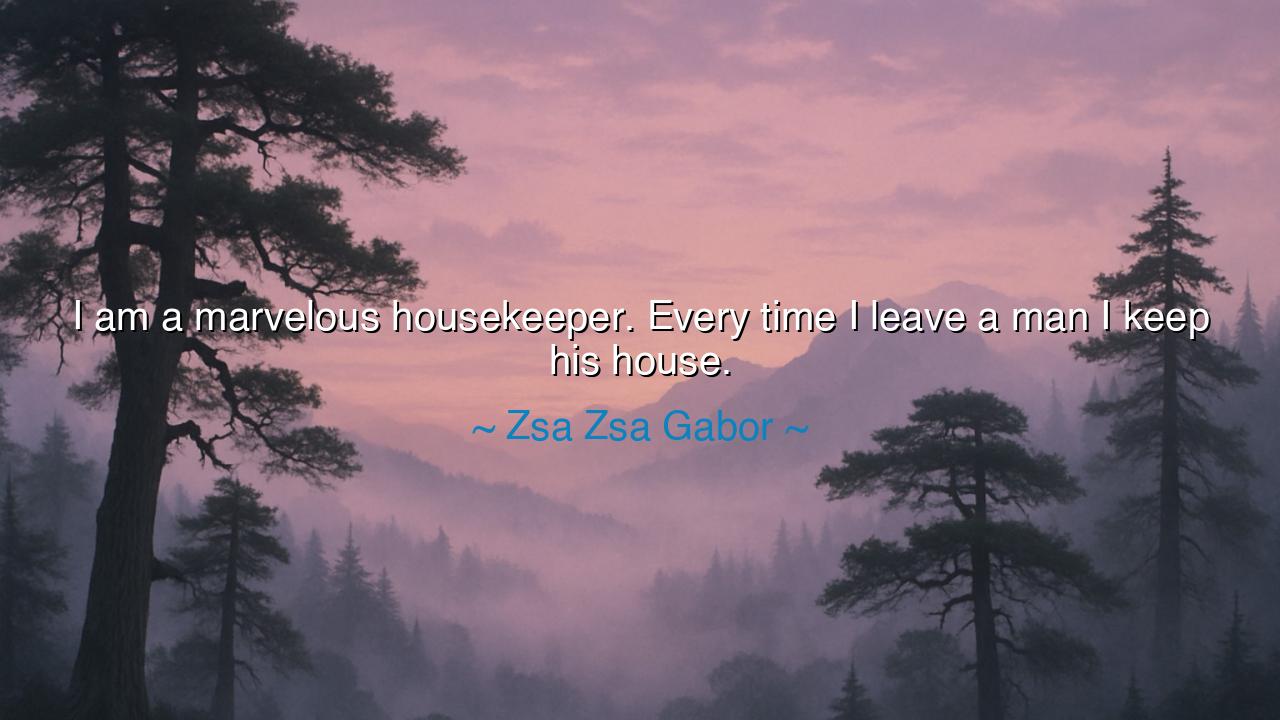
I am a marvelous housekeeper. Every time I leave a man I keep his






“I am a marvelous housekeeper. Every time I leave a man, I keep his house.” Thus spoke Zsa Zsa Gabor, the glittering starlet of old Hollywood, a woman as famous for her wit as for her beauty and many marriages. Though her words sparkle with humor and irony, they conceal beneath their shine a deeper meditation on self-worth, independence, and power in relationships. For in that jest — half laughter, half revelation — Zsa Zsa declares not her vanity, but her triumph: that even in leaving, she retains something of substance, a mark of having lived not as a dependent, but as a sovereign woman.
In the ancient days, women were seldom free to speak so boldly. They were taught that their worth resided in submission, that to serve the household was nobler than to own it. Yet Zsa Zsa, a woman of the twentieth century, arose from that old order like a goddess draped in diamonds, her laughter a weapon, her charm a shield. When she calls herself a “marvelous housekeeper,” she mocks the expectation that women must serve — and instead turns the phrase into a declaration of victory. For she does not keep house in the traditional sense; she keeps it by inheritance, by wit, by strength of will.
Her quote is born of satire, but it echoes a universal truth: those who know their worth cannot be diminished by loss. Zsa Zsa’s humor veils a deeper defiance — that she will not be defined by her marriages or her divorces, but by her resilience. Where others might have spoken in shame of failure, she speaks in triumph of survival. Her jest transforms what society called scandal into spectacle, and what others deemed ruin into renewal. Each “house” she keeps becomes a symbol — not of conquest, but of continuity. In every ending, she claims a beginning; in every departure, she claims her due.
Consider the tale of Cleopatra, queen of Egypt, whose allure and intellect swayed empires. When Rome sought to subdue her, she turned diplomacy into art and seduction into strategy. Like Zsa Zsa, she understood that power takes many forms — sometimes spoken softly through laughter, sometimes through beauty sharpened by wit. Both women, separated by millennia, shared the same truth: that control of one’s fate is the greatest treasure a woman can possess. Cleopatra ruled kingdoms; Zsa Zsa ruled rooms — yet both wielded the same weapon: charm forged with cunning, and humor masking authority.
And yet, Zsa Zsa’s brilliance lies not only in rebellion, but in the way she redefines victory. Her words do not glorify greed, but self-preservation. To “keep the house” is not merely to possess — it is to claim one’s share of what was built together. In her age, this was more than cleverness; it was justice dressed as jest. She laughed at a world that judged her, and through laughter, she disarmed it. In this, her humor becomes wisdom — the wisdom of knowing that to survive in a world of imbalance, one must sometimes turn irony into armor.
There is a lesson here for all who love and lose: that dignity need not vanish when relationships end. Too often, the world teaches that to part ways is to fail, that endings are shameful. But Zsa Zsa’s wit tells another story — that endings, too, can be empowerments. To walk away with grace, with self-respect intact, is a far greater housekeeping than any labor of domestic order. Her “keeping” is metaphorical — it is the keeping of one’s soul, one’s wit, and one’s joy amid the wreckage of romance.
So, O listener, take this teaching to heart: when love fades, let not your light fade with it. Do not measure your worth by who remains beside you, but by what strength remains within you. If a chapter closes, do not mourn the house left behind — build anew, or keep what is yours by right of effort and endurance. Like Zsa Zsa, learn to turn sorrow into laughter, loss into legend.
Thus, the humor of Zsa Zsa Gabor becomes a parable of strength. “Every time I leave a man, I keep his house.” The line, born in jest, endures as a testament — that those who know their value will never walk away empty-handed. Whether what you keep is a house, a lesson, or the peace of your own heart, make sure it is yours — not by chance, but by courage. For laughter, when born of strength, becomes the voice of victory; and every wise soul, like Zsa Zsa, learns in time to smile even as they reclaim their throne.






AAdministratorAdministrator
Welcome, honored guests. Please leave a comment, we will respond soon